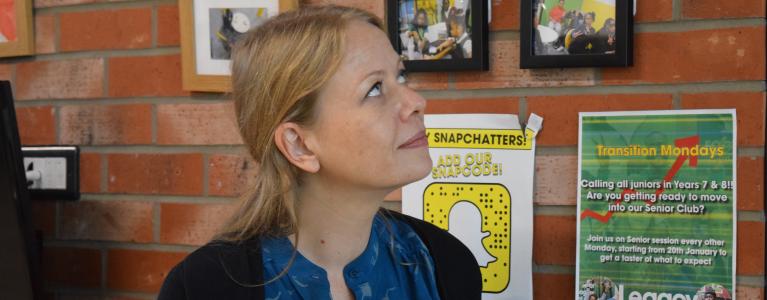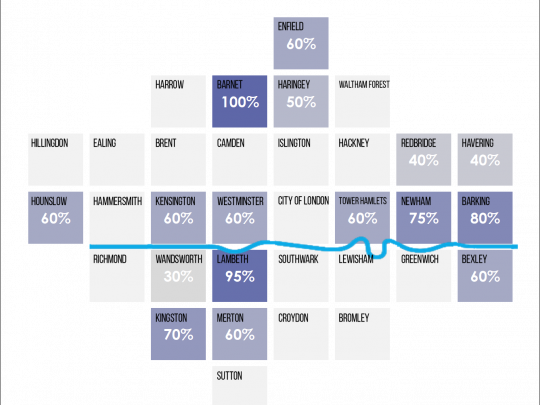
Young people in London have seen 33 years’ worth of youth centre closures across London due to coronavirus, reveals stark new data from Sian Berry AM.
Producing a snapshot of what happened to London’s youth centres and services during the pandemic, Sian gathered data from councils across London to measure how they fared as the city went into emergency lockdown.
Today’s briefing shows the extent to which councils have struggled to maintain youth services during the pandemic, facing the crisis of coronavirus added the ongoing effects of austerity policies. Sian Berry found that:
- The running total of youth centre closure days from the start of lockdown in March 2020 until December, is over 12,000 days, or more than 33 years.
- The average youth service level councils have been able to maintain during the pandemic, through digital, one-to-one and distanced support, is just 62 per cent.
- Budget data from councils so far is incomplete, as many councils have been unable yet to provide data. But we can estimate that:
- Compared with 2020-21, at least a further £2 million will be cut from council youth service budgets in London in 2021-22 (data from 13 councils).
- Youth service budgets for 2021-22 are more than 50 per cent down in the last decade compared with 2011-12 (data from 16 councils with consistent data).
The report, A lost year for youth work?, is the first of a two-part investigation Sian will be releasing this year looking at youth services in London.
Sian Berry says:
This report finds London’s youth services in a crisis in the middle of a crisis and struggling on two fronts.
My previous work has shown how youth services were already being decimated by austerity squeezing council budgets.
Now we can see that the pandemic has further swept away frontline services this year, as well as causing extra difficulties for young people struggling without their schools, communities and support networks.
While councils have tried to switch to digital services, their efforts can only so far when so many young people face barriers to access including poor internet, lack of devices and no private space in which to engage.
Our young people have endured so much over the past year and now face an uncertain future on top of the mental health pressure of long periods of isolation. It’s vital that we keep them at the heart of any recovery – this lost year cannot be allowed to become a lost generation.
The data for this report was collected after almost a year of the pandemic. It offers a first look at both the immediate crisis and the potential long-term impact on youth services in London.

Last year the Mayor pledged an additional £2.1 million to support young Londoners who had been most impacted by the coronavirus lockdown. [2]
However, the Mayor has recently announced in his 2021-22 budget that he will be reducing direct support for youth services after three years of the Young Londoners Fund providing additional grants to youth programmes. Instead his latest budget promises only a medium term commitment to a strategic and advocacy role for City Hall at a London level. [3]
Rosemary Watt-Wyness, Chief Executive of London Youth said:
This has been a very difficult year for young Londoners and the organisations that support them. This report gives us invaluable insight into the funding challenges facing London’s community youth organisations. It highlights our serious concerns about the threat to many of our 650+ members, after a decade of damaging cuts has been compounded by COVID-19.
This pandemic has proven how much young people need the trusted relationships and support that they get from youth work. Given that young Londoners are facing such a range of complex challenges to being happy, healthy, safe and skilled, it is unthinkable that funding continues to be cut from youth service budgets across the city. All young Londoners, no matter where they live, should be able to rely on high-quality youth services in their community.
Despite the challenges, I am comforted and inspired by the dedication and determination of London’s youth professionals to improve the lives of young people. Throughout this pandemic, youth workers have adapted, persevered, and done everything they can to ensure that young people have support that they can rely on.
Notes to editors
References
Of the 20 councils who have so far provided usable data about youth centre closures, Sian found that more than 90 youth centres shut for various periods between 23 March and December 2020. The total of 33 years is based on the number of days and weeks councils said they had to shut their doors.
[1] A Lost year for youth work? Sian Berry AM, Mar 2021 https://www.london.gov.uk/sites/default/files/final_a_lost_year_for_you…
[2] Mayor invests £2.1m in positive opportunities for young people, July 2020:
https://www.london.gov.uk/press-releases/mayoral/fund-for-summer-and-au…
[3] Mayor budget for 2021-22. Mayor of London, Mar 2021 https://www.london.gov.uk/sites/default/files/md2795_appendix_1_-_2021-…
GLA: MAYOR BUDGET, 2021-22
8.25 It is not envisaged that the GLA will continue to fund services for young people at the scale that has been made possible by previous one-off allocations, but a £1.5m baseline budget has been included for 2021-22 and 2022-23 to ensure that the GLA can continue to play a strategic role in convening and supporting stakeholders at a London level to support learning and best practice, to ensure that the voices of young Londoners are heard, and to advocate for London’s young people.